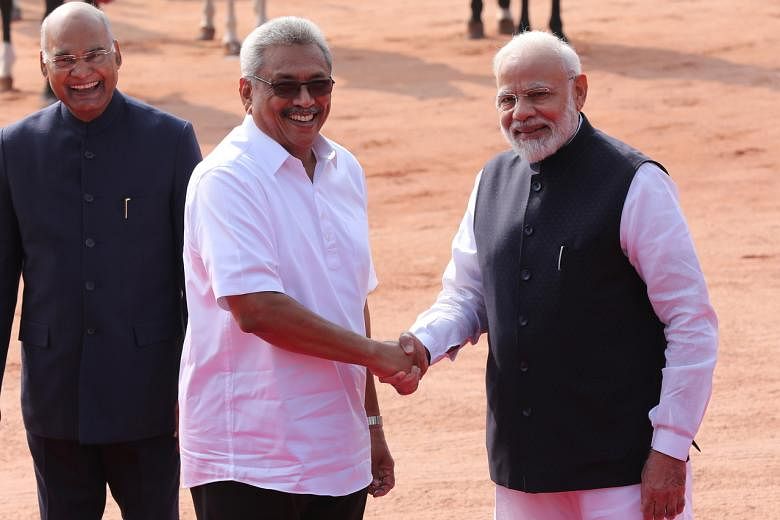NEW DELHI - Indian Prime Minister Narendra Modi announced a line of credit of US$450 million ($615 million) for Sri Lanka on Friday (Nov 29), but also underlined how both countries needed to remain "mindful of each other's security and sensitivities'', amid growing Chinese influence in Sri Lanka.
The amount included US$50 million for counter-terrorism efforts.
The announcement came after Mr Modi's talks with Sri Lankan President Gotabaya Rajapaksa, who is on a maiden visit to India after his recent victory in the presidential election.
The new president appointed his brother Mahinda Rajapaksa - a two-term president himself - as prime minister. The brothers are credited with ending Sri Lanka's civil war against the Liberation Tigers of Tamil Eelam in 2009.
At a media event with Mr Rajapaksa, Mr Modi said: "We accord priority to our relations with Sri Lanka. The security and development of our two countries are inseparable. Therefore, it is only natural we remain mindful of each other's security and sensitivities."
He noted that the president's visit would "give further impetus to mutual relations'' and "promote development in both countries and prosperity, peace and stability in the region'.'
Counter-terrorism remained a key part of talks. Sri Lanka suffered a devastating terror attack on Easter Sunday this year, when suicide bombings on three churches and three hotels killed 269 people.
Noting that the line of credit would be used to "enhance the capabilities of Sri Lanka's intelligence agencies", Mr Rajapaksa said: "Since our recent experience in April this year, we have had to rethink our national security strategies... assistance from India in this regard is most appreciated."
India and Sri Lanka traditionally have close cultural and historical links. Still, New Delhi had watched with concern the growing ties between Colombo and Beijing, particularly when Mr Mahinda Rajapaksa was in power between 2005 and 2015.
The China tilt also resulted in Colombo falling into a debt trap, owing billions of dollars in loans to Beijing.
New Delhi had also protested when Mr Mahinda Rajapaksa allowed Chinese submarines to berth in Sri Lanka in 2014.
India had felt at the time that Mr Mahinda Rajapaksa had not done enough to help displaced Tamils after the end of the civil war in 2009.
After his talks with Mr Gotabaya Rajapaksa, Mr Modi said he remained confident that the new president would fulfil the aspirations of the Tamil minorities.
India has been working at improving ties with the Rajapaksa family. Days after the election results, Indian Foreign Minister S. Jaishankar travelled to Colombo with an invitation from Mr Modi for Mr Rajapaksa to visit India first.
Mr Rajapaksa said on Friday that he also wanted Mr Modi to be the first foreign leader to visit Colombo during his tenure.
"I am certainly very happy to be here because India is our closest neighbour and close standing friend. We will continue to work with India to ensure that the Indian Ocean remains a zone of peace,'' he said.
Despite the positive atmospherics, analysts said the two countries still have a long way to go.
"The two sides have begun well but there is a long way to go in restoring mutual trust," said Mr N. Sathiya Moorthy, senior fellow and director of Observer Research Foundation's Chennai initiative.
"China will remain important for Sri Lanka in terms of aid and economic cooperation, apart from the post-economic political and emotional ties. With India, it is a much longer history, with unavoidable ups and downs.''


